NCTC’s partner in Beijing

It’s always exciting for NCTC microbiologists to visit other Culture Collections and a recent opportunity to drop in on the China Center of Industrial Culture Collection(CICC)was no exception.
Julie Russell, Head of Culture Collections, was an invited speaker at the 7th International Symposium on Microbiological Safety Control organised by CICC in Beijing on 23rd August 2018. Julie said ” It was a great opportunity to showcase NCTC’s role in supporting research and diagnostic testing in clinical and veterinary microbiology and to describe our renowned NCTC 3000 sequencing project which we completed earlier this year. The opportunity to meet the team at CICC was an added bonus”.
CICC is one of nine national culture collections of microorganisms within China, the same number as in the UK. Visits to other collections confirm that the overarching processes and equipment used to operate bacterial culture collections across the globe is very similar. Curators obtain cultures and associated data from the depositors, microbiologists preserve the strains in master banks to be kept for ever and also in stock batches for delivery to third parties and they undertake quality control testing to assure strain authenticity. Archiving, storage and strain dispatch requires carefully thought out processes and an online catalogue is essential for other laboratories to access the strains.
In common with NCTC, CICC is a member of the World Federation for Culture Collections (WFCC) which manages the reference strain catalogue for the World Data Centre for Microorganisms (WDCM). NCTC and CICC have exchanged bacterial strains in the past and the WDCM catalogue indicates we have numerous equivalent strains such as WDCM 00004, a strain of Campylobacter coli available from both collections.
One of the outcomes from the visit was a determination to share more cultures and best practice between NCTC and CICC. CICC will generate whole genome sequences for selected strains and the two collections will be collaborating much more closely in the future.
